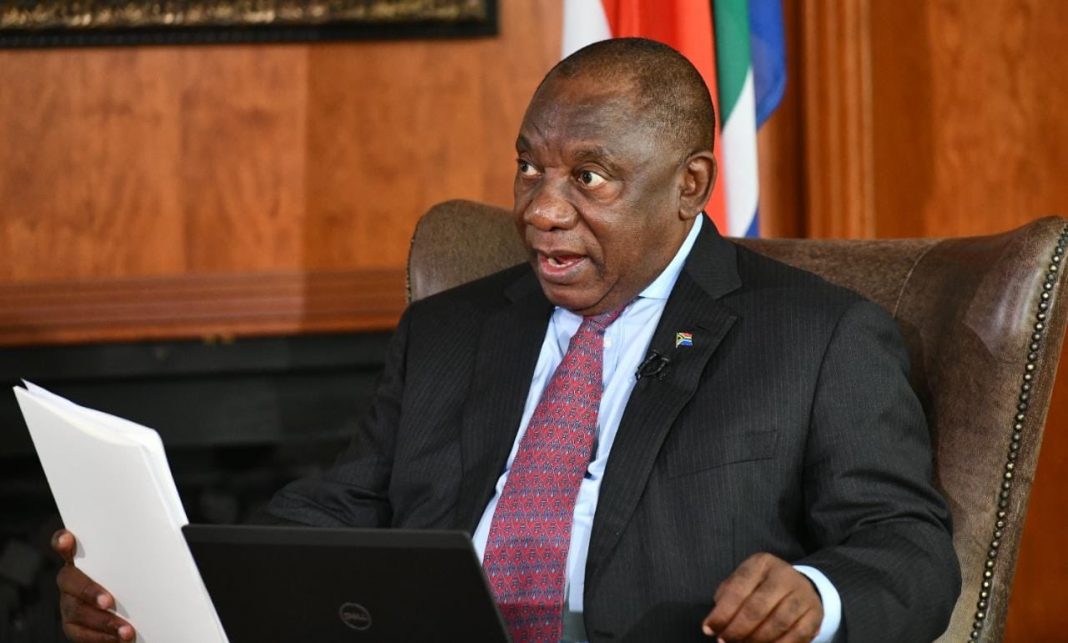CHARLES MOLELE
UNDER immense pressure to reopen the economy to avoid further economic damage, President Cyril Ramaphosa announced on Saturday night that his government would ease the hard lockdown to alert Level 2 as from midnight on Monday.
This follows consultations with provincial and local government, including sound advice from health experts and scientists, he said.
In a televised address, Ramaphosa said government would now lift the ban on alcohol and tobacco products and further allow restaurants and taverns across South Africa to return to normal business, subject to strict hygiene regulations.
While movement around provinces would be allowed under Level 2, restrictions on international travel remained in place, he said.
Ramaphosa said it has been an immensely difficult five months, and the pandemic has taken a heavy toll – on the health of South Africans, on families and communities, on the public health system, on the economy and on people’s everyday lives.
He said the country has made progress in the fight against COVID-19 and that all indications are that South Africa had reached the peak of COVID-19 infections.
He said a fall in the infection rates, as well as people recovering, were ‘significantly reducing the pressure on our health facilities’, but he cautioned that cases could easily surge if people fail to maintain vigilance.
Over the last three weeks, said Ramaphosa, the number of new confirmed cases has dropped from a peak of over 12,000 a day to an average over the past week of around 5,000 a day.
“The recovery rate from coronavirus has risen from 48% at the time of my last address and now stands at 80%,” he said.
“The cumulative number of cases in our country remains extremely high at 583,653. However, the number of active cases is declining every day, and now stands at around 105,000. The virus appears to have peaked in several provinces, including the Western Cape, Eastern Cape, Gauteng and possibly in KwaZulu-Natal.”
DA interim leader John Steenhuisen slammed Ramaphosa’s address, saying the damage to the economy has been done and millions of jobs have already been lost.
He said Ramaphosa’s address was nothing but a capitulation to the real power in the ANC, who desperately wanted to cling to the “new normal” they have created for SA these past 5 months.
The decision to extend the State of Disaster by must be regarded with the utmost suspicion, he said.
“The only thing the lockdown achieved was the devastation of our economy and the loss of millions of jobs. And that is what President Ramaphosa and his government must take responsibility for,” said Ramaphosa.
“The President admitted this evening that the models used to justify shutting down the economy were wrong. This is not something he can casually mention and walk away from. If they paralysed our economy for five months based on wrong information, heads must roll right at the top.”
Ernst Roets, Head of Policy and Action at AfriForum, said corruption, in particular theft of money earmarked for relief because of the COVID-19 pandemic, has not been dealt with.
In a statement, AfriForum said the President had been warned by the country and the world’s experts to act differently but he “succumbed to pressure from his corrupt comrades and could not resist the temptation to hold on to power in an irrational manner”.
“Now to thank the president for relaxing the lockdown measures would be like a prisoner thanking his kidnapper when he is set free. We are not suffering from Stockholm syndrome,” said Roets.
He said in the coming weeks, AfriForum will publish a plan containing practical steps the government could take to empower the private sector to repair the damage caused by the lockdown.
He said the organisation is also working on a comprehensive strategy for self-management amounting to minorities assuming responsibility for their own future and taking practical action to acquire greater control over their own affairs.
The Economic Freedom Fighters (EFF), on the other hand, said in a statement Saturday that they rejected the relaxation of lockdown regulations in the midst of the Coronavirus pandemic, and warned that it was a mistake that could lead to a great loss of life.
The EFF said that “Cyril Ramaphosa in collaboration with the Health Department has conspired to manipulate” the data to “rationalise the reopening of the economy at the cost of lives”.
Political analyst William Mervyn-Gumede slammed Ramaphosa’s address, saying adopting a one-size fits all approach to the fight against COVID-19 pandemic was counter-productive.
Gumede said vulnerable areas, or provinces identified as epicentres of coronavirus such as Western Cape, KwaZulu Natal, Eastern Cape and Gauteng, should have been kept under hard lockdown o curb the spread of the pandemic.
He also slammed government for failing to properly use the R500 billion loan guarantee scheme to assist small businesses, hardest hit by the pandemic.
In his speech, Ramaphosa argued that on Thursday, he convened all the social partners in NEDLAC, namely government, labour, business and community.
“We are now working together on an urgent economic recovery programme that places the protection and creation of employment at its centre,” he said.
“We will be making announcements on the outcome of this work in the next few weeks. We will use this moment not only to return South Africa to where it was before, but to transform our country to a more equal, more just and more dynamic economy.”
(COMPILED BY INSIDE POLITICS STAFF)



